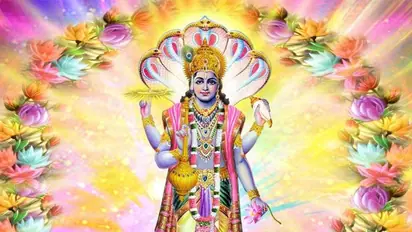Devshayani or Ashadhi Ekadashi 2023: Know the significance, How to observe and more

Synopsis
Devshayani Ekadashi, also known as Ashadhi Ekadashi, is a significant Hindu festival observed during the Hindu month of Ashadha. It marks the beginning of the Chaturmas period, during which Lord Vishnu is believed to go into a deep slumber for four months.
Devshayani Ekadashi, also known as Ashadi Ekadashi or Shayani Ekadashi, is a significant Hindu festival celebrated on the eleventh day (Ekadashi) of the dark fortnight (Krishna Paksha) in the month of Ashadha (June-July) in the Hindu calendar. It marks the beginning of the four-month period known as Chaturmas, which is considered highly auspicious for spiritual practices and self-discipline.
This year, the Ashadhi Ekadashi, or Devshayani Ekadashi is being celebrated today (June 29).
Here are some key aspects that highlight the significance of Ashadhi Ekadashi:
-
Devotion to Lord Vishnu: Ashadhi Ekadashi is primarily observed as a day dedicated to Lord Vishnu, the preserver and protector in Hinduism. Devotees believe that by fasting and offering prayers to Lord Vishnu on this day, they can seek his blessings, protection, and forgiveness for their sins.
-
Pandharpur Wari: The most notable aspect of Ashadhi Ekadashi is the famous pilgrimage known as "Pandharpur Wari." It is a traditional procession of devotees, also called "warkaris," who embark on a journey to the town of Pandharpur in Maharashtra. The warkaris walk for miles, singing devotional songs and carrying palanquins (palkhis) containing the paduka (footprints) of the revered saint-poet Tukaram or the idols of Lord Vitthal and Rukmini (an incarnation of Lord Krishna and his consort). The warkaris' devotion and participation in this pilgrimage symbolize their dedication to Lord Vitthal.
-
Spiritual cleansing and purification: Ashadhi Ekadashi is considered an auspicious day for spiritual purification. Devotees observe a fast on this day, abstaining from food and water for 24 hours. Fasting is believed to cleanse the body and mind, helping individuals focus on spiritual practices, such as meditation, chanting mantras, and reading sacred texts.
-
Significance for farmers: As Ashadhi Ekadashi falls during the monsoon season in India, it holds special importance for farmers. They view this occasion as an opportunity to seek blessings for good rainfall, fertility of the land, and bountiful harvests. It is a time when farmers express gratitude to the divine forces for their sustenance and pray for agricultural prosperity.
-
Cultural and social celebrations: Ashadhi Ekadashi is celebrated with enthusiasm and fervor in Maharashtra and Gujarat. Along with the Pandharpur Wari, various cultural programs, processions, and devotional gatherings take place. People dress in traditional attire, perform folk dances like lezim, and sing devotional songs praising Lord Vitthal.
Overall, Ashadhi Ekadashi holds immense religious, cultural, and social significance. It provides an opportunity for devotees to express their devotion, seek spiritual growth, and connect with their faith and traditions. The festival also promotes unity, devotion, and harmony among communities and strengthens the bond between humans and the divine.
Now let's look at the significance of Devshayani Ekadashi
-
The Sleeping Period of Lord Vishnu: Devshayani Ekadashi is associated with the belief that Lord Vishnu goes into a deep slumber, known as Yoga Nidra, on this day. It is said that Lord Vishnu rests on the cosmic serpent Shesha in the Kshirasagara, the ocean of milk, during this period. He remains in this state of rest until Dev-Prabodhini Ekadashi, which falls in the month of Kartik (October-November), when he wakes up.
-
Observance of Fasting: Devotees observe a fast on Devshayani Ekadashi to seek the blessings of Lord Vishnu and attain spiritual merits. Fasting on this day is believed to cleanse one's body and mind, purify the soul, and bring about spiritual growth. It is common for devotees to abstain from consuming grains, lentils, and certain specific foods during the fast.
-
Significance for Lord Vishnu Devotees: Devotees of Lord Vishnu consider Devshayani Ekadashi as a highly auspicious day to offer prayers, chant Vishnu Sahasranama (the thousand names of Lord Vishnu), Hare Krishna Mahamantra and engage in devotional activities. They believe that by observing this Ekadashi with sincerity and devotion, one can receive blessings, forgiveness for sins, and spiritual enlightenment.
-
Festive Celebrations: Devshayani Ekadashi is celebrated with enthusiasm in various parts of India. Devotees visit Vishnu temples, offer flowers, fruits, and other offerings to the deity, and participate in devotional singing and chanting. Some regions also organize processions and cultural programs to mark the occasion.
-
Spiritual Practices and Charity: The period of Chaturmas, which begins with Devshayani Ekadashi, is considered an opportune time for spiritual practices, such as meditation, reading religious scriptures, and performing acts of charity. Devotees engage in virtuous deeds, donate food, clothes, and other essentials to the needy, and strive to lead a disciplined and righteous life during this period.
Devshayani Ekadashi holds immense significance for devotees of Lord Vishnu. It provides an opportunity for introspection, self-discipline, and spiritual growth. The festival reinforces the belief in the cosmic cycle of Lord Vishnu's slumber and awakening and serves as a reminder of the importance of devotion, righteousness, and self-control in one's life.
Explore the latest Lifestyle News covering fashion, wellness, travel, Food and Recipes, and more. Stay updated with trending Health News, fitness tips, and expert insights to inspire your daily living. Discover personalized lifestyle trends that keep you stylish and informed. Download the Asianet News Official App from the Android Play Store and iPhone App Store for everything that adds value to your everyday life.